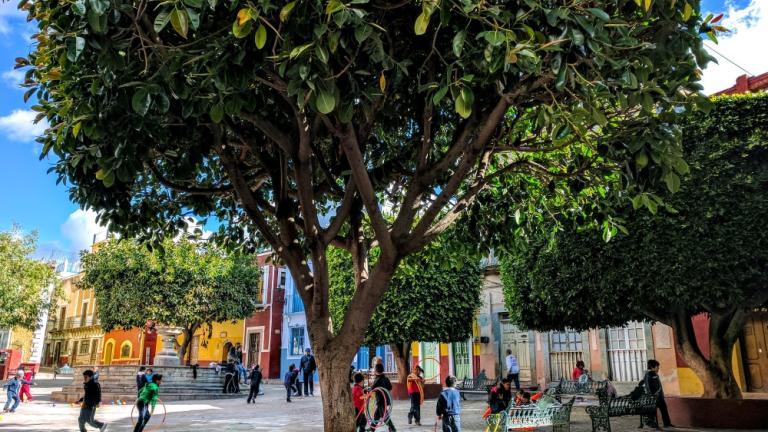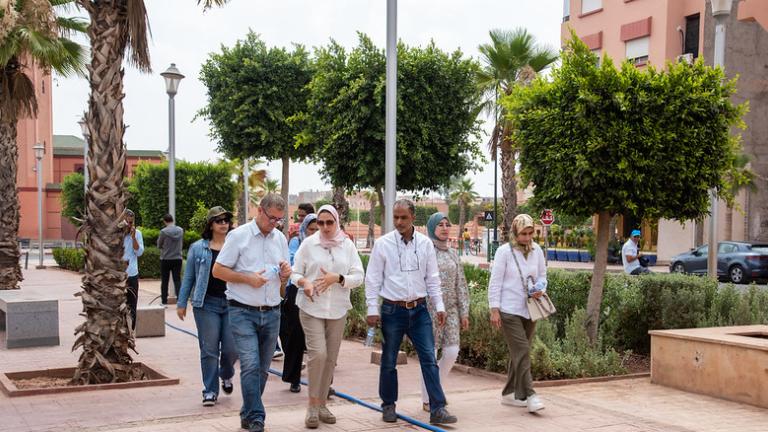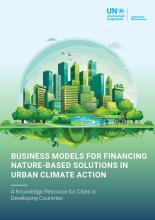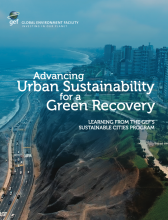Recap
UrbanShift: Kickstarting the movement for sustainable cities
In preparation for its full launch later in 2021, UrbanShift held its first virtual Partnership Engagement Group meeting, bringing together representatives from the GEF, the UrbanShift implementing team and 16 key global organizations.
Marco Verch / Flickr
With more than half the world’s population living in cities, a figure predicted to grow to 70 percent by 2050, it is an increasingly urban world.
And while our cities might be key to economic growth, they are also major drivers of environmental degradation, consuming two-thirds of the world’s energy and accounting for 70 percent of global greenhouse gas emissions.
The need for a transformational shift towards compact, low-carbon, resilient, and inclusive urban environments has never been clearer than it is today – a challenge the Global Environment Facility and partners are meeting head on through UrbanShift, the GEF’s Sustainable Cities Impact Program.
Aiming to enable a worldwide movement of cities to achieve an equitable, resilient, low-carbon future, UrbanShift is the largest grant-funded initiative of its kind, supporting cities across Asia, Africa, and Latin America to adopt integrated approaches to urban development.
In preparation for its full launch later in 2021, UrbanShift recently held its first virtual Partnership Engagement Group meeting. The role of the Partnership Engagement Group is to coordinate with other key urban initiatives and alliances, identify opportunities to collectively support UrbanShift beneficiary cities, and identify potential implementation and delivery partners for the project’s outputs.
The first meeting brought together representatives from the GEF and the UrbanShift global implementing team (the UN Environment Programme, World Resources Institute, C40 Cities, and ICLEI - Local Governments for Sustainability), along with representatives of 16 key organizations including the World Bank, World Wildlife Fund (WWF), the World Business Council for Sustainable Development (WBCSD) and the UN Development Programme.
"The Partnership Engagement Group is envisioned as a high-level strategic partnership of urban actors that will serve to create opportunities for collaboration on integrated, sustainable urban development at the global level," said Aloke Barnwal, Senior Climate Change Specialist at the GEF. "We would also like to bring together existing global initiatives and expertise through this group for developing innovative and impactful solutions at the cities level."
UrbanShift is working with 23 cities across India, China, Indonesia, Morocco, Rwanda, Sierra Leone, Costa Rica, Argentina, and Brazil, advocating for integrated development approaches such as nature-based solutions, transit-oriented development, low emission zones, and integrated waste management. The program is also building a knowledge and learning platform to connect these cities with global expertise and cutting-edge research, as well as offering a space to share experiences and forge partnerships.
The Partnership Engagement Group has been created to advance this learning and collaboration. UrbanShift builds on the GEF’s Sustainable Cities Integrated Approach Pilot, which has supported 28 cities across 11 countries, and the GEF-6 Global Platform for Sustainable Cities.
"The training and resources provided by the UrbanShift global platform will allow our cities to reimagine their urban fabric and equip them to tackle complex environmental, climate, and social challenges,” Ruth Zugman Do Coutto, joint portfolio manager of the UNEP GEF Climate Change Mitigation Unit, said. “The Partnership Engagement Group will help identify existing resources and develop new cutting-edge knowledge products."
During the meeting, several opportunities for collaboration were identified and discussed, particularly in the areas of climate action and city finance.
“WWF’s corporate partnership team has shown growing interest in the urban agenda – these partnerships could be leveraged to support the target cities on key climate issues in the nine program countries,” offered Jennifer Lenhart, Global Lead at WWF Cities. Kyra Appleby, from the Cities, States & Regions team at CDP, added: “CDP runs finance cohorts on sustainable infrastructure investment for North America cities that could be adapted for UrbanShift’s local finance academies.”
Roland Hunziker from the WBCSD highlighted the importance of bringing in private sector expertise and leadership to urban sustainability challenges and mentioned existing WBCSD initiatives on transforming the built environment and urban mobility, as well as food systems, and resources which could become part of the UrbanShift library of solutions, such as their guide for corporate electric vehicle fleet adoption, Sustainable Mobility: Policy Making for Data Sharing, or their Building System Carbon Framework.
The meeting resulted in the creation of thematic taskforces, including advocacy and private sector taskforces, that will provide strategic guidance on UrbanShift’s activities. The role of the taskforces will be to extend the UrbanShift partnership and create synergies around local projects in the beneficiary cities, enhancing their sustainable urban development initiatives.
“We are looking forward to developing a truly fruitful partnership, facilitating the transformation of our cities for both people and planet,” concluded Rogier van den Berg, Director of Urban Development for WRI Ross Center for Sustainable Cities.
Learn more

WRI, UNEP, GEF and Partners Launch “UrbanShift” to Transform Cities for People and Planet
UrbanShift will engage mayors, the private sector, UN agencies, multilateral development banks and other partners to support national and city governments. It will also serve as a knowledge & learning platform to connect cities with global expertise.

After a devastating earthquake, Marrakech plans to build back with resilience
Reflecting on how, with UrbanShift's support, the city of Marrakech is making strides to enhance its urban nature and lower emissions.

Business Models for Financing Nature-Based Solutions in Urban Climate Action
This publication serves as a comprehensive guide to financing and developing business models for Nature-based Solutions (NbS) addressing climate challenges in urban areas.

Advancing Urban Sustainability for a Green Recovery
Drawing from the experiences of cities under the GEF's Sustainable Cities program (including UrbanShift cities), this report looks at key urban sustainability elements and solutions and discusses strategies that advance green recovery.

